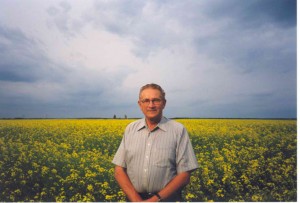
Canola is also known as Rapeseed. Its seeds are crushed to make vegetable oil.
Since we’re only a few days past Independence Day, I thought I’d take a look at the borders between the dominion of the public and the gated garden of the private. In 1998, multinational industrial agrichemical giant Monsanto discovered that a Canadian farmer named Percy Schmeiser was growing its Roundup Ready Canola in his fields. The seeds that grow into our food have generally been considered public property. That is, our foods are held in common by allhumans; no one person or company can own the seeds that sustain civilization.
Monsanto had the U.S. Plant Variety Protection Act of 1970 at their back, though. That law gives companies the right to exclusively own the DNA of the plant varieties they develop. That right of ownership includes the sole right to “reproduce” the plant, i.e. to generate the seed from which the plants grow. That means that a farmer or gardener is forbidden to save the seeds produced from one year’s crop in order to plant the next year. Schmeiser was growing Monsanto’s genetically-modified (GM) plants without paying for them. Continue reading
